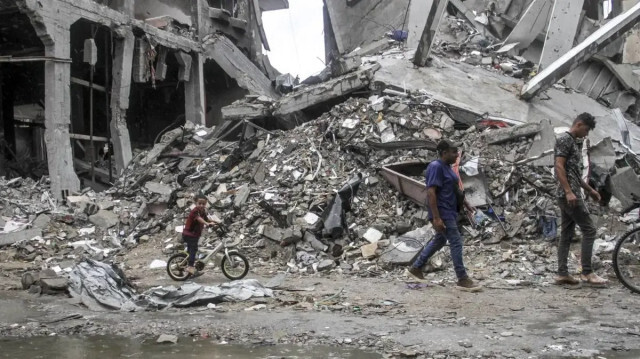
‘Any proposals from any party should fundamentally focus on compelling Israeli Prime Minister Benjamin Netanyahu… to implement what was previously agreed upon,' says Hamas official
Palestinian resistance movement Hamas on Thursday said it sticks to a proposal backed by the US President Joe Biden and a UN Security Council resolution for a cease-fire in Gaza."We confirm our adherence to what was agreed upon after President Biden-backed proposal at the end of May, and UN Security Council Resolution No. 2735, which the movement agreed to on July 2,” Khalil al-Hayya, a member of Hamas's political bureau, said in a video clip posted on Telegram. He said that “any agreement must include a comprehensive halt to the aggression against our Palestinian people, a complete withdrawal (of Israeli forces) from the Gaza Strip, including the Philadelphia Corridor, the right of displaced people to return, relief for our people, and reconstruction of what was destroyed by the occupation (forces), leading to a serious and genuine hostage swap deal.” "We do not need new proposals, and any proposals from any party should fundamentally focus on compelling Israeli Prime Minister Benjamin Netanyahu and his fascist government to implement what was previously agreed upon, not to return to square one or spin in the same vicious circle that Netanyahu wants," al-Hayya added. “If the US administration and President Biden genuinely want to reach a cease-fire and achieve a hostage swap deal, they must abandon their blind bias toward the Israeli occupation, exert real pressure on Netanyahu and his government, and compel them to adhere to what was previously agreed upon,” he said. The group has started communicating with mediators and several regional and international countries to clarify its position and the status of the negotiations, the political bureau member continued. Last May, Biden said Israel presented a three-phase deal that would end hostilities in Gaza and secure the release of hostages held in the coastal enclave. The plan includes a cease-fire, a hostage-prisoner exchange, and the reconstruction of Gaza. Netanyahu insists on maintaining a military presence along the Philadelphi Corridor, claiming that the corridor is a “lifeline” for Hamas to rearm. The axis, a demilitarized area along Egypt's border with Gaza, has been a sticking point in Gaza cease-fire and prisoner swap negotiations between Israel and Hamas. Egypt rejects any Israeli military presence on the corridor and has denounced Netanyahu's claims about weapons smuggling into Gaza through its territory. Last week, Israeli Defense Minister Yoav Gallant said that the Israeli military's withdrawal from the Philadelphi Corridor poses no security problem to Israel. For months, the US, Qatar, and Egypt have been trying to reach an agreement between Israel and Hamas to ensure a prisoner exchange and a cease-fire and allow humanitarian aid to enter Gaza. But mediation efforts have been stalled due to Netanyahu's refusal to meet Hamas' demands to stop the war. Israel has continued its brutal offensive on the Gaza Strip since an Oct. 7 Hamas attack despite a UN Security Council resolution demanding an immediate cease-fire. Nearly 40,900 Palestinians, mostly women and children, have since been killed and nearly 94,400 others injured, according to local health authorities. An ongoing blockade of the enclave has led to severe shortages of food, clean water and medicine, leaving much of the region in ruins. Israel faces accusations of genocide for its actions in Gaza at the International Court of Justice.

